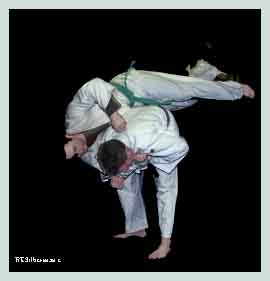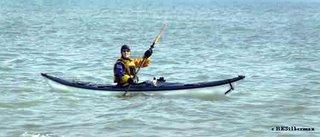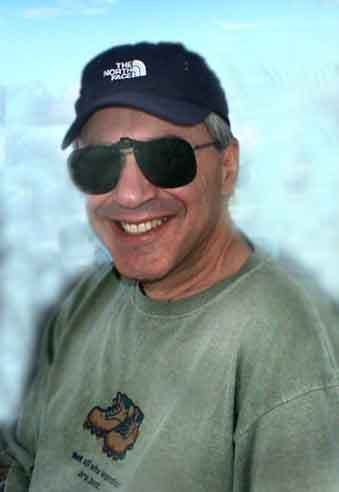The Gentle Way of Life

Gentle? Doesn't look like the guy on top, soon to be the guy on the floor, is getting gentle treatment. Truth be known, he is totally relaxed and will feel virtually nothing as he lands on the mat. Actually, both these men are totally relaxed as they perform Ippon Seonage (single shoulder throw). How can it be that at such a dynamic moment, at the peak of action, 2 Judokai can be so relaxed? More importantly, how can one of them, being so relaxed, have gotten a man up in the air with so little effort? That, my friends, is the secret of Judo...and most every other sport I've played (yes, we play Judo)
First let me tell you that this sport (derived from the acutal fighting technique of Ju Jitsu) is named with a 2 syllable word. Ju, Japaneese for gentle, and Do, the way. Judo, the gentle way. Now, this stuff, done on concrete to an unknowing attacker can be fatal. It is rare, however, for a Judoka to ever get into a fight (we walk away, nothing to prove). You also need to understand that the Ju or gentle translates a little differently than the way we use gentle in english. It actually translates more like yielding.
Example: A tree and a tall reed stand along side one another. A breeze comes along and bends the reed while the tree stands impassively. The breeze passes, and the reed stands upright once more. A bigger wind comes along, and the same thing happens. Bigger and bigger winds come up with the same results until, finally, a tornado passes through. In the ferocious winds, the reed simply lies down while the oak is snapped in two and killed. After the wind passes, it is the thin reed that survives. Hence we have one of the great maxims of Judo: There is great power in yielding.
Unspoken is the difference between strength and power, and this very principle is what escapes many athletes and competitors.
Suppose I have the strength that measures, say, 5, and yours measures 10. Now, if we push against one another, you will push me back with a force of 5 (10 minus 5 = 5). Using force, there is no way I can "win". You have superior strentgth.
But if you push with your 10 and I pull with my 5, I will amass a force of 15 and defeat you handily. Even though you still have superior force, I have created a situation in which I have the ultimate power.
So, I always tell my Judo students (and, now my sea kayak students), "If you are working hard, you are doing it wrong."
In Judo, we practice by having one player agree to relax and be thrown. By doing this, the other man learns to do the technique in the absence of resistance. Consequently, he applies very little force and developes good form and technique. At first, he does so slowly until every nuance of the technique is right. Then, he gradually increases speed until, given the right dynamics, the technique is so smoothly applied that resistance is futile. So it can be with sea kayaking.
Practice (or teach) in quite waters when the wind is calm. Break the technique down and practice the parts slowly until they feel natural. Add the components and slowly increase the pace and conditions. How many of us, when the waves start to grow, remember to relax and open the top hand? Or, do you clutch that sucker with all your might hoping to overcome the force of the water?
Be the reed. Relax your hands. The water and the wind will always have superior force, always. All we can hope to do is yield to what is and to use our power.

Paddle safely, and relaxedd
DS








3 comments:
Such a way with words. . .Great lesson for all!!!
I didn't know you were a judo instructor. That's pretty cool. I dabbled in tae kwon do and brazilian jiu jitsu before I fell into kayaking but we didn't really have a philosophy other than training hard.
Thanks for the comments. Actually, I have done Judo for some 45 years. DS
Post a Comment